A Golden Retriever’s boundless energy, playful nature, and shiny coat are a testament to his overall health and well-being. And just like us, your health is closely tied to your diet. Proper nutrition is the foundation of your vitality. It’s important to know that not all foods are created equal, especially when it comes to our four-legged friends. While we can safely enjoy any food, our Golden Retrievers have sensitive digestive systems, and their digestion can be affected by ingredients that are perfectly safe for humans. Some foods can cause digestive issues, while others can be downright toxic. This is why it’s critical to understand the list of Toxic Foods for Golden Retrievers. These foods can lead to serious health problems and even life-threatening situations.
Knowing which foods to avoid is just as important as knowing which foods are good for you. This blog is your guide to the potentially dangerous world of dog food. You will receive a comprehensive list of Toxic Foods for Golden Retrievers that should never be given to them. We will cover the specific reasons why these foods are harmful, the potential consequences of eating them, and offer safe alternatives that will allow your furry friend to live a long, healthy, and happy life. To protect your Golden Retriever, you first need to know what not to put in his Food bowl.
Contents
- 1 Toxic Foods for Golden Retrievers
- 2 Foods That Can Cause Stomach Upsets or Allergic Reactions
- 3 The Dangers of Raw Foods and Bones
- 4 Human Snacks and Processed Foods to Avoid
- 5 Keeping Your Golden Retriever Safe: Plants and Fruits to Avoid
- 6 Conclusion
Toxic Foods for Golden Retrievers
To protect your golden retriever from potential dangers, you must first learn what Foods should never be put in their bowl. While they may be willing to try everything you eat, some foods can be toxic and pose serious health risks. It is important to be vigilant and aware of these dangers.
Chocolate and Caffeine
Chocolate, a popular human treat, contains theobromine and caffeine. Both are methylxanthines, stimulants that are toxic to dogs. The severity of the poisoning depends on the type and amount of chocolate you ate, as well as the size of your Golden Retriever. Dark chocolate and chocolate contain higher concentrations of theobromine and are therefore more dangerous than milk chocolate.
Symptoms
Symptoms of chocolate and caffeine poisoning can range from mild to severe and include:
- Vomiting and diarrhea
- Restlessness and hyperactivity
- Rapid breathing and heart rate
- Tremors and muscle spasms
- Irregular heartbeat
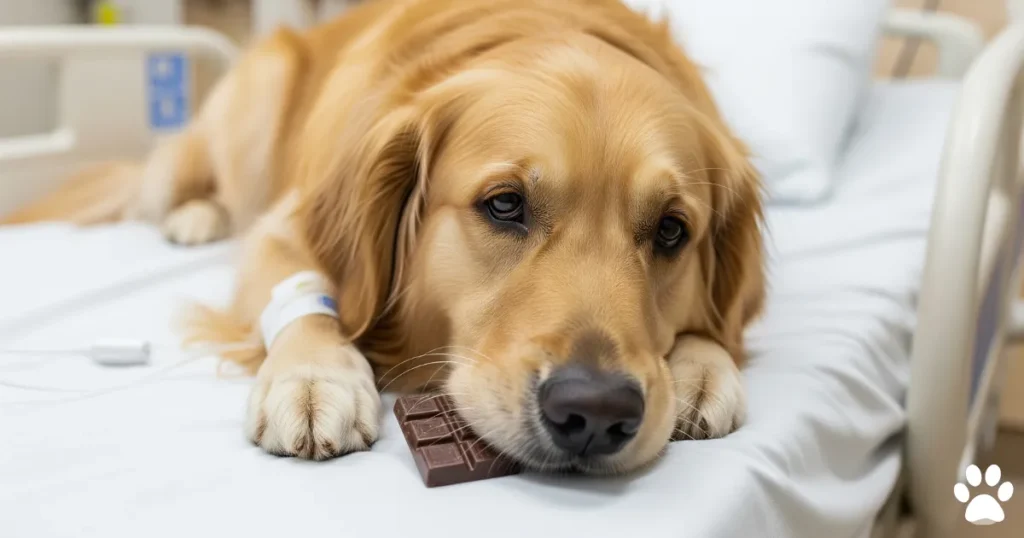
Grapes and Raisins
Grapes and raisins can cause kidney failure in dogs, even in small amounts. The exact toxic ingredient is unknown, but the effects can be devastating. The first signs of grape or raisin poisoning may include:
- Vomiting and diarrhea
- Loss of appetite
- Lethargy and weakness
- Abdominal pain
- Decreased urine output
- Inability to urinate
Onions, Garlic, and Chives
Onions, garlic, and chives, whether raw, cooked, or chopped, contain thiosulfates, which are substances that can damage red blood cells in dogs. This damage can lead to anemia, a condition in which the body does not have enough healthy red blood cells to carry oxygen. They are harmful whether raw or cooked. Even small amounts can be toxic, and the effects are not always immediately noticeable.
Symptoms of onion or garlic poisoning may include:
- Lethargy and weakness
- Pale mucous membranes
- Rapid breathing
- Rapid heartbeat
- Vomiting
- Diarrhea
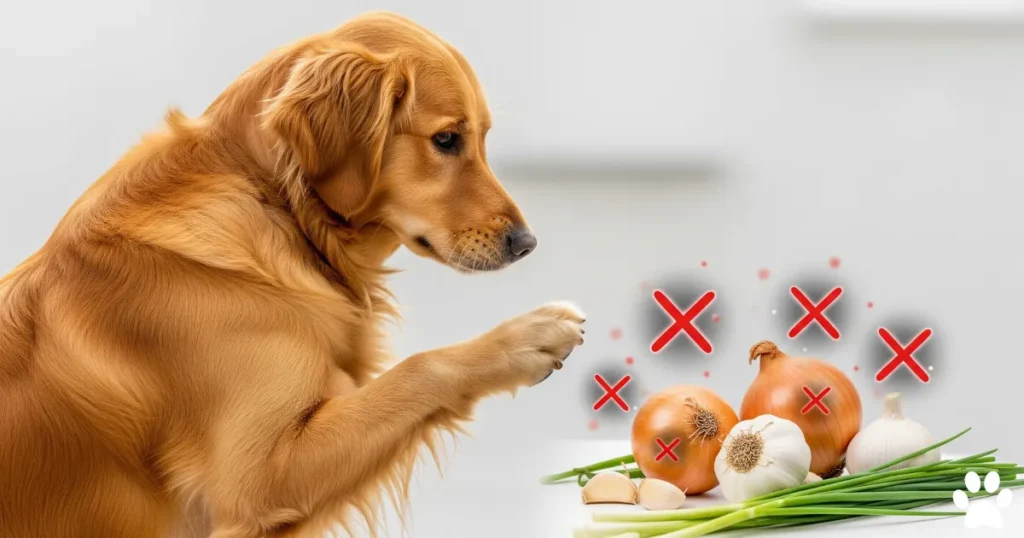
Alcohol and Raw Pasta
Alcoholic beverages contain ethanol, which can cause alcohol poisoning in dogs. Even small amounts can cause:
- Vomiting and diarrhea
- Loss of coordination
- Tremors and seizures
- Stop breathing
Uncooked yeast dough can also be dangerous. Yeast causes the dough to rise in the warm, moist environment of the stomach, leading to the following symptoms:
- Bloating and upset stomach
- Vomiting
- Intestinal obstruction
Yeast dough also produces ethanol as a byproduct, which further contributes to alcohol poisoning. If your Golden Retriever has consumed alcohol or raw pasta, contact your veterinarian immediately.
Xylitol (artificial sweetener in sugar-free products)
Xylitol is an artificial sweetener found in many sugar-free products, including:
- Sugar-free gum
- Candy Baked goods
- Peanut butter
Xylitol is extremely toxic to dogs and can cause:
- A sharp drop in blood sugar (hypoglycemia)
- Liver failure
Symptoms of xylitol poisoning can come on quickly and include:
- Vomiting Weakness and lethargy
- Tremors and seizures
- Jaundice (yellowing of the skin and eyes)
Foods That Can Cause Stomach Upsets or Allergic Reactions
Some Foods are directly toxic to Golden Retrievers, while others can cause stomach upsets or allergic reactions, leading to discomfort and potential health problems. Recognizing these culprits is critical to the well-being of your furry friend.
Dairy Products (Milk, Cheese, Ice Cream)
Many dogs, including Golden Retrievers, are lactose intolerant. This is because they do not produce enough lactase, the enzyme needed to break down lactose, the sugar in milk. Consuming dairy products can result in the following symptoms:
- Diarrhea
- Vomiting
- Bloating
- Feeling of fullness
- Stomach upset
Fried and Fatty Foods
Fried and Fatty foods are a recipe for digestive problems in golden retrievers. These foods can cause pancreatitis, a severe inflammation of the pancreas. A high-fat Diet can also contribute to the following health conditions:
- Obesity
- Heart disease
- Digestive disorders.
Nuts (Macadamias, Walnuts, Almonds, etc.)
While some nuts are not inherently toxic (except for macadamias), they can still cause digestive problems and pose a choking hazard. Macadamia nuts are especially dangerous and contain a toxin that can cause the following symptoms:
- Vomiting
- Shaking
- Weakness
- Fever
Other nuts, such as walnuts and almonds, can be difficult for dogs to digest and may cause the following symptoms: vomiting and diarrhea, intestinal blockage, choking. It is best to keep all nuts out of your Golden Retriever’s reach.
Spicy Foods and Seasonings
Spicy foods and seasonings can irritate your dog’s sensitive digestive system, which may lead to the following symptoms:
- Vomiting and diarrhea
- Upset stomach
- Excessive thirst
Some spices, such as chili peppers, paprika, and curry, can be especially harmful. Garlic and onion powder are also harmful. Even small amounts of these herbs can cause digestive upset and possible health problems. It is best to feed your dog soft foods.
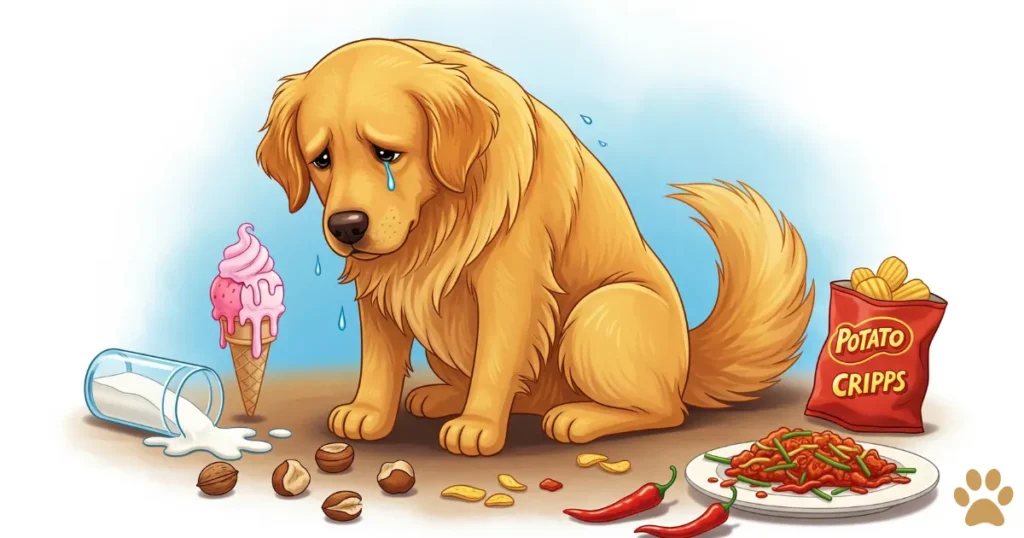
The Dangers of Raw Foods and Bones
The appeal of a Raw Food diet or the desire to give your golden retriever a bone may seem obvious, but this practice carries potential risks. To ensure the safety and health of your furry friend, it is important to understand these dangers.
Raw Meat and Eggs (Salmonella and E. Coli Risk)
Raw meat and raw eggs can contain harmful bacteria such as Salmonella and E. Coli. These pose a risk not only to your dog, but also to your family. Although some raw Food advocates claim that dogs’ digestive systems are equipped to fight off these bacteria, there is a significant risk of contamination and illness. Improper handling and storage of raw foods can lead to bacterial growth and thus increase the risk of infection.
If you choose to feed raw meat to your pet, make sure it comes from a reputable source and handle it with extreme care. Practice proper hygiene to minimize contamination. Safer alternatives include lightly cooking meat, which kills bacteria and preserves some of its nutritional value. Always consult your veterinarian before adding raw food to your Golden Retriever’s diet.
Cooked Bones (Chicken, Pork, etc.)
Cooked bones, especially chicken and pork, are a choking hazard and can cause serious internal injuries. When cooked, bones become brittle and can easily splinter. These shards can become lodged in your dog’s throat, esophagus, or intestines, causing choking, cuts, or blockages.
Instead of cooked bones, choose safe chew alternatives such as durable rubber toys, dental chew toys, or raw recreational bones (large, non-weight-bearing bones that are too large to swallow). Always supervise your Golden Retriever when chewing on bones or toys.
Raw Fish (Parasite Risk)
Raw fish may contain harmful parasites that can make dogs sick. Some types of fish, such as salmon and trout, may contain parasites that can cause potentially fatal “salmon poisoning.”
Human Snacks and Processed Foods to Avoid
It’s tempting to share your Golden Retriever’s favorite treats, especially when your pup has pleading eyes. However, many snacks and processed foods are unhealthy and should be strictly avoided.
Salty Foods (Chips, Pretzels, Processed Meats)
Salty foods like chips, pretzels, and processed meats like hot dogs and deli meats are high in sodium. While a small amount of salt is essential for dogs, too much sodium can lead to:
Dehydration:
Salt draws water out of cells, causing dehydration and electrolyte imbalances.
Sodium Poisoning:
In severe cases, high sodium levels can cause sodium poisoning, which can lead to vomiting, diarrhea, tremors, seizures, and even death.
Kidney Problems:
Long-term consumption of salty foods can put stress on the kidneys and contribute to kidney disease.
Avoid giving your Golden Retriever snacks. Instead, choose homemade or low-salt snacks.
Sugar and Sugary Foods
Sugar and sugary foods are a cause of health problems in Golden Retrievers. These treats can lead to:
Obesity:
Excessive sugar intake contributes to weight gain and obesity, which increases the risk of joint problems, diabetes, and heart disease.
Diabetes:
High sugar levels can disrupt insulin regulation and lead to diabetes.
Dental Problems:
Sugar contributes to tooth decay and gum disease.
Additionally, artificial sweeteners like xylitol, which are often found in sugar-free candies and gum, are extremely toxic to dogs. They can cause liver failure and hypoglycemia. Avoid any sweet or sugary foods and always check the ingredients on sugar-free products.
Fast Food and Junk Food
Fast food and junk food are full of unhealthy fats, sodium, and preservatives. Therefore, they are not a good choice for Golden Retrievers. These foods can lead to:
Obesity:
High-calorie and fatty foods contribute to weight gain and obesity.
Pancreatitis:
Fatty foods can cause pancreatitis, a severe inflammation of the pancreas.
Digestive problems:
Processed ingredients and artificial additives can irritate the digestive system.
Long-term health risks:
Regularly eating fast food and junk food can increase the risk of heart disease, kidney problems, and other chronic health problems.
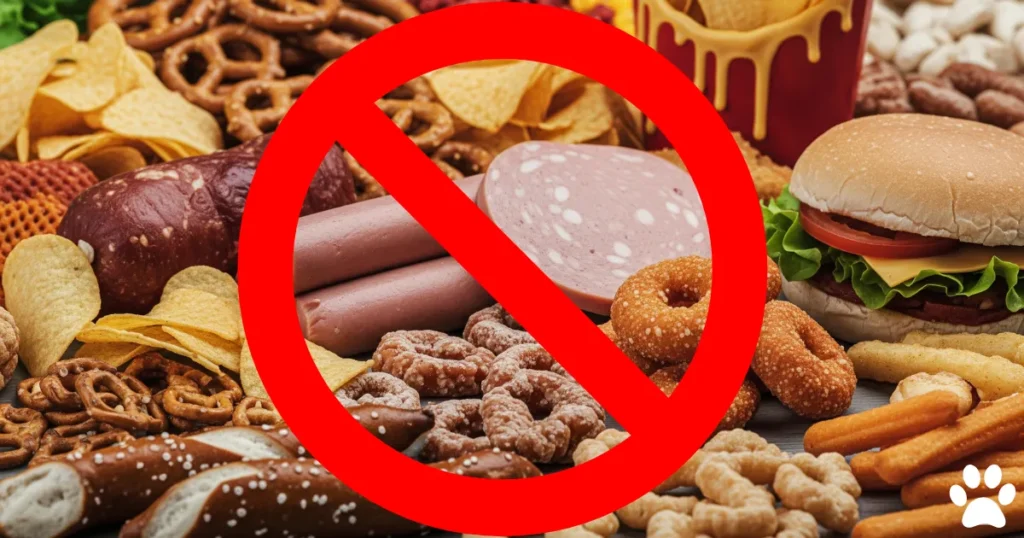
Keeping Your Golden Retriever Safe: Plants and Fruits to Avoid
Golden Retrievers, with their playful spirits and boundless energy, love exploring the world around them. As loving pet parents, it’s our responsibility to ensure their safety, especially when it comes to the plants and fruits they might encounter. While we often focus on providing healthy treats, it’s equally important to be aware of the potential dangers lurking in our gardens and kitchens.
Avocado: A Delicious Danger
Avocados, while a superfood for humans, contain a toxin called persin, which is particularly harmful to dogs. Persin is found in the leaves, pit, fruit, and bark of the avocado tree. Ingesting persin can lead to digestive upset, including vomiting and diarrhea. In more severe cases, it can cause breathing difficulties and fluid accumulation in the chest and abdomen.
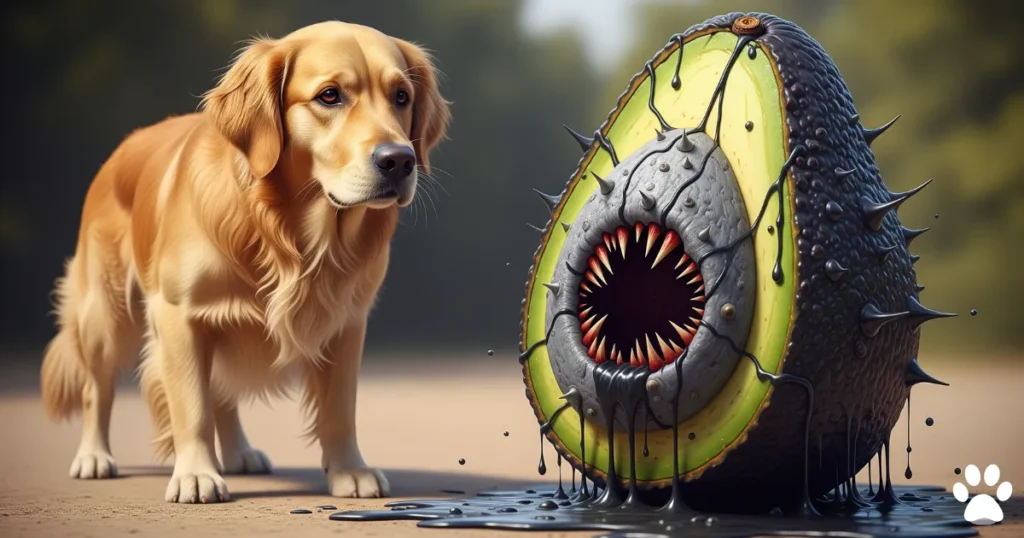
Tomatoes: Ripe vs. Risky
Tomatoes are a staple in many households, but did you know that unripe or green tomatoes Toxic Foods for Golden Retrievers. These unripe fruits contain solanine, a toxic glycoalkaloid. While ripe tomatoes generally don’t pose a threat, consuming large amounts of the green parts or unripe tomatoes can lead to solanine poisoning. Symptoms include gastrointestinal distress, tremors, and even seizures.
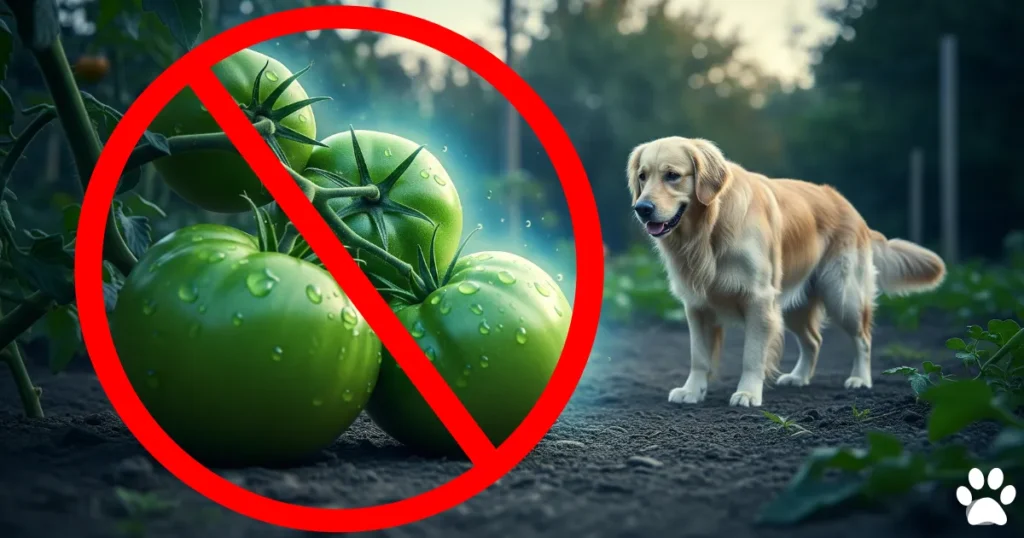
Mushrooms: Wild Dangers
While some mushrooms are perfectly safe for humans, wild varieties can be deadly for dogs. It’s impossible to tell which wild mushrooms are toxic without expert knowledge. Many poisonous mushrooms contain toxins that can cause liver failure, kidney failure, and even death.
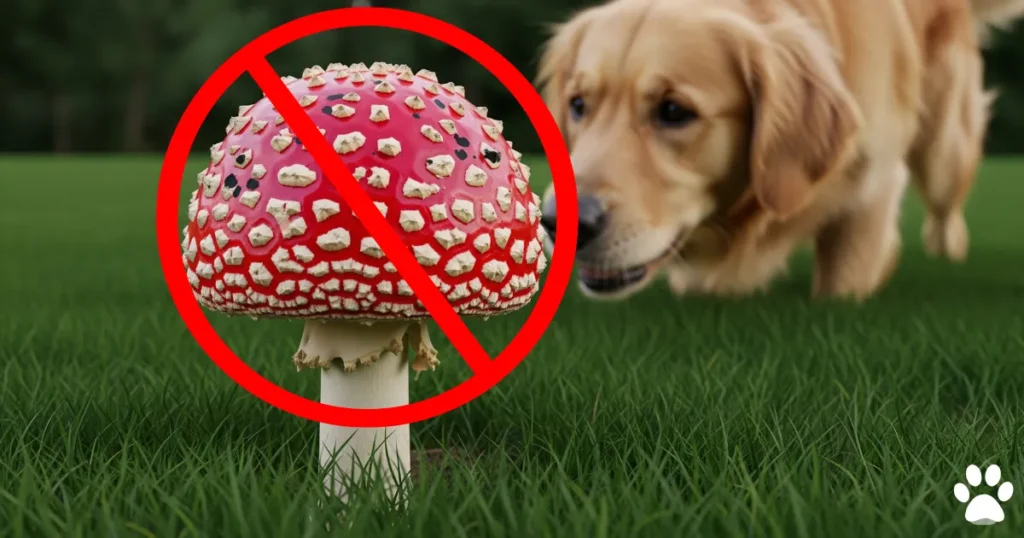
Conclusion
Your Golden Retriever not only depends on your love and companionship, but also on his health and safety, especially when it comes to nutrition. While it may be tempting to share snacks or let him explore the kitchen and garden, knowing what’s harmful is essential to responsible pet ownership. From everyday treats like chocolate and grapes to lesser-known hazards like xylitol, raw fish, and even some fruits and plants, the risks can range from minor digestive upsets to life-threatening illnesses. By avoiding the harmful foods for Golden Retrievers listed in this guide, you’ll be making an important contribution to your dog’s health, longevity, and happiness. Instead of risky leftovers or processed snacks, choose veterinarian-recommended treats and a balanced diet specifically formulated for your Golden Retriever’s nutritional needs. When in doubt, always consult your veterinarian before introducing new foods. Your furry friend gives you unconditional love every day—do the same by making safe, informed decisions about your dog’s diet. Healthy nutrition is one of the best gifts you can give your Golden Retriever to ensure a long, healthy, and vibrant life
Dr. Nabeel A.
Hi, I’m Dr. Nabeel Akram – a farm management professional by trade and a passionate Golden Retriever enthusiast at heart. With years of experience in animal science and livestock care, I’ve built a career around understanding animals—how they live, thrive, and bring value to our lives. This blog is a personal project born from that same passion, focusing on one of the most loyal and lovable breeds out there: the Golden Retriever. Whether I’m managing farm operations or sharing insights on canine health, behavior, and care, it all ties back to one core belief—animals deserve thoughtful, informed, and compassionate attention. Welcome to a space where professional expertise meets genuine love for dogs.
Facebook |
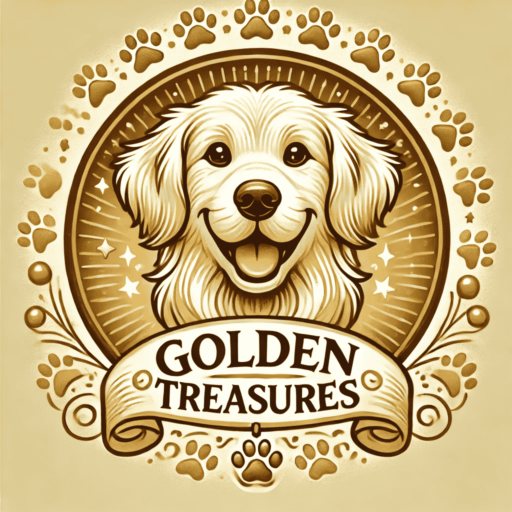
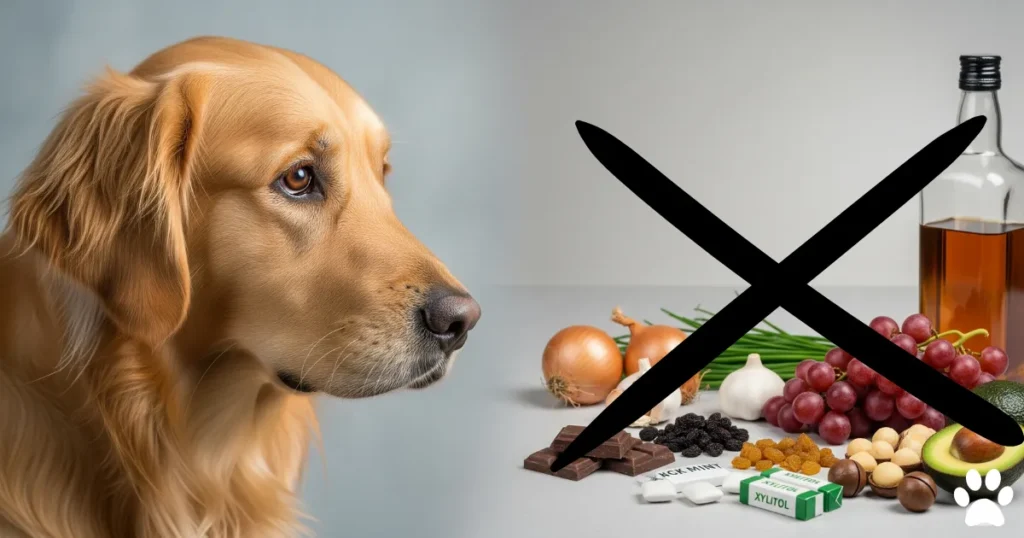
Links will be automatically removed from comments.